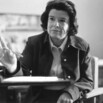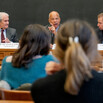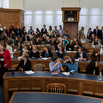Clinic Issues Report Confirming Guam Veterans’ Exposure to Dioxin Herbicides Like Agent Orange
According to a new white paper released on May 8, 2020 by the Veterans Legal Services Clinic at Yale Law School (VLSC) and the National Veterans Legal Services Program (NVLSP), veterans who served on Guam from 1962 to 1975 satisfy the U.S. Department of Veterans Affairs (VA) legal standard for exposure to Agent Orange and other dioxin-containing herbicides. The conclusion is based on an exhaustive review conducted over nearly two years of government, private, archival, and oral history evidence of herbicide use in Guam during the Vietnam era.
“This white paper confirms the reports of countless veterans who served on Guam but whose claims the VA has wrongly rejected,” said Bart Stichman, Executive Director of NVLSP. “It is time that the VA acknowledge the strong evidence of toxic herbicide exposure in Guam and care for veterans exposed.”
“Like many of the early veterans’ Agent Orange claims dismissed by the VA in the 1970s and 1980s, Guam veterans have been fighting for overdue recognition of their in-service disabilities,” said John Rowan, National President of Vietnam Veterans for America. “Guam veterans now have an overwhelming case that will require the VA to finally recognize these meritorious claims.”
For the island’s role during the Vietnam War, Guam has been called “the site of the most immense buildup of air power in history.” At the height of bombing operations during Vietnam, three-quarters of all U.S. B-52 aircraft available for operations in Southeast Asia were based in Guam. This rapid U.S. airpower buildup in Guam — coupled with the unique climate conditions of the island and acute housing and water shortages — created a pressing need within the island’s military leadership to control fire risks and tropical growth with heavy herbicide usage.
“Service members have said for years that they sprayed Agent Orange and other toxic herbicides all across Guam,” said Brian Moyer, a Marine veteran who served in Guam from 1974–76 and leads the group Agent Orange Survivors of Guam, a section of Military Veterans Advocacy. “So many of us were exposed and, sadly, many have already passed away — with no recognition from the VA.”
“Official government accounts of herbicide mishandling, improper hazardous waste disposal, and high concentrations of dioxin across Guam establish exposure pathways to support claims of service connection based on herbicide exposure,” said James Campbell ’20, a law student in the Clinic. “We hope that veterans advocates and lawmakers will build on this report to address unremediated health risks and military pollution in Guam.”
The Veterans Legal Services Clinic was founded in 2010 to train law students and to serve the legal needs of veterans. Under the supervision of clinical professors, Clinic students engage in litigation before administrative agencies and courts on a range of matters.
The National Veterans Legal Services Program (NVLSP) is an independent, nonprofit veterans service organization that has served active duty military personnel and veterans since 1981.


